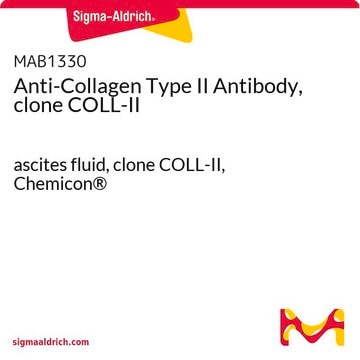ZRB1201
Anti-Collagen Type II Antibody, clone 1K11 ZooMAb® Rabbit Monoclonal

recombinant, expressed in HEK 293 cells
Sinônimo(s):
Collagen alpha-1(II) chain;Alpha-1 type II collagen
About This Item
Produtos recomendados
fonte biológica
rabbit
Nível de qualidade
recombinante
expressed in HEK 293 cells
conjugado
unconjugated
forma do anticorpo
purified antibody
tipo de produto de anticorpo
primary antibodies
clone
1K11, recombinant monoclonal
descrição
recombinant, expressed in HEK 293 cells
linha de produto
ZooMAb® learn more
forma
lyophilized
peso molecular
calculated mol wt 141.79 kDa
observed mol wt ~140 kDa
purificado por
using Protein A
reatividade de espécies
human, chicken
reatividade da espécie (prevista por homologia)
equine, porcine, monkey, bovine, feline, canine
embalagem
antibody small pack of 25 μL
características do produto alternativo mais ecológico
Waste Prevention
Designing Safer Chemicals
Design for Energy Efficiency
Learn more about the Principles of Green Chemistry.
validação aprimorada
recombinant expression
Learn more about Antibody Enhanced Validation
sustainability
Greener Alternative Product
técnica(s)
ELISA: suitable
flow cytometry: suitable
immunocytochemistry: suitable
immunohistochemistry: suitable
western blot: suitable
Isotipo
IgG
sequência de epítopo
C-terminal half
nº de adesão de ID de proteína
nº de adesão UniProt
categoria alternativa mais ecológica
Condições de expedição
ambient
temperatura de armazenamento
2-8°C
modificação pós-traducional do alvo
unmodified
Informações sobre genes
human ... COL2A1(1280)
Descrição geral
Imunogênio
Aplicação
Evaluated by Western Blotting on Pepsin digest of Chicken sternal collagen Type II.
Western Blotting Analysis (WB): A 1:1,000 dilution of this antibody detected Pepsin digest of Chicken sternal collagen Type II.
Tested applications
Immunocytochemistry Analysis: A 1:100 dilution from a representative lot detected Collagen Type II in Human chondrocytes.
Immunohistochemistry (Paraffin) Analysis: A 1:100 dilution from a representative lot detected Collagen Type II in Human cartilage tissue sections.
Flow Cytometry Analysis: 1 μg from a representative lot detected Collagen Type II in one million Human chondrocytes.
Enzyme Immunoassay Analysis (ELISA): Serial dilutions from a representative lot detected purified Human Collagen Type II.
Note: Actual optimal working dilutions must be determined by end user as specimens, and experimental conditions may vary with the end user
Evaluated by Western Blotting on Pepsin digest of Chicken sternal collagen Type II.
Western Blotting Analysis (WB): A 1:1,000 dilution of this antibody detected Pepsin digest of Chicken sternal collagen Type II.
Descrição-alvo
forma física
Reconstituição
Armazenamento e estabilidade
Informações legais
Exoneração de responsabilidade
Not finding the right product?
Try our Ferramenta de seleção de produtos.
Código de classe de armazenamento
11 - Combustible Solids
Classe de risco de água (WGK)
WGK 1
Certificados de análise (COA)
Busque Certificados de análise (COA) digitando o Número do Lote do produto. Os números de lote e remessa podem ser encontrados no rótulo de um produto após a palavra “Lot” ou “Batch”.
Já possui este produto?
Encontre a documentação dos produtos que você adquiriu recentemente na biblioteca de documentos.
Nossa equipe de cientistas tem experiência em todas as áreas de pesquisa, incluindo Life Sciences, ciência de materiais, síntese química, cromatografia, química analítica e muitas outras.
Entre em contato com a assistência técnica







